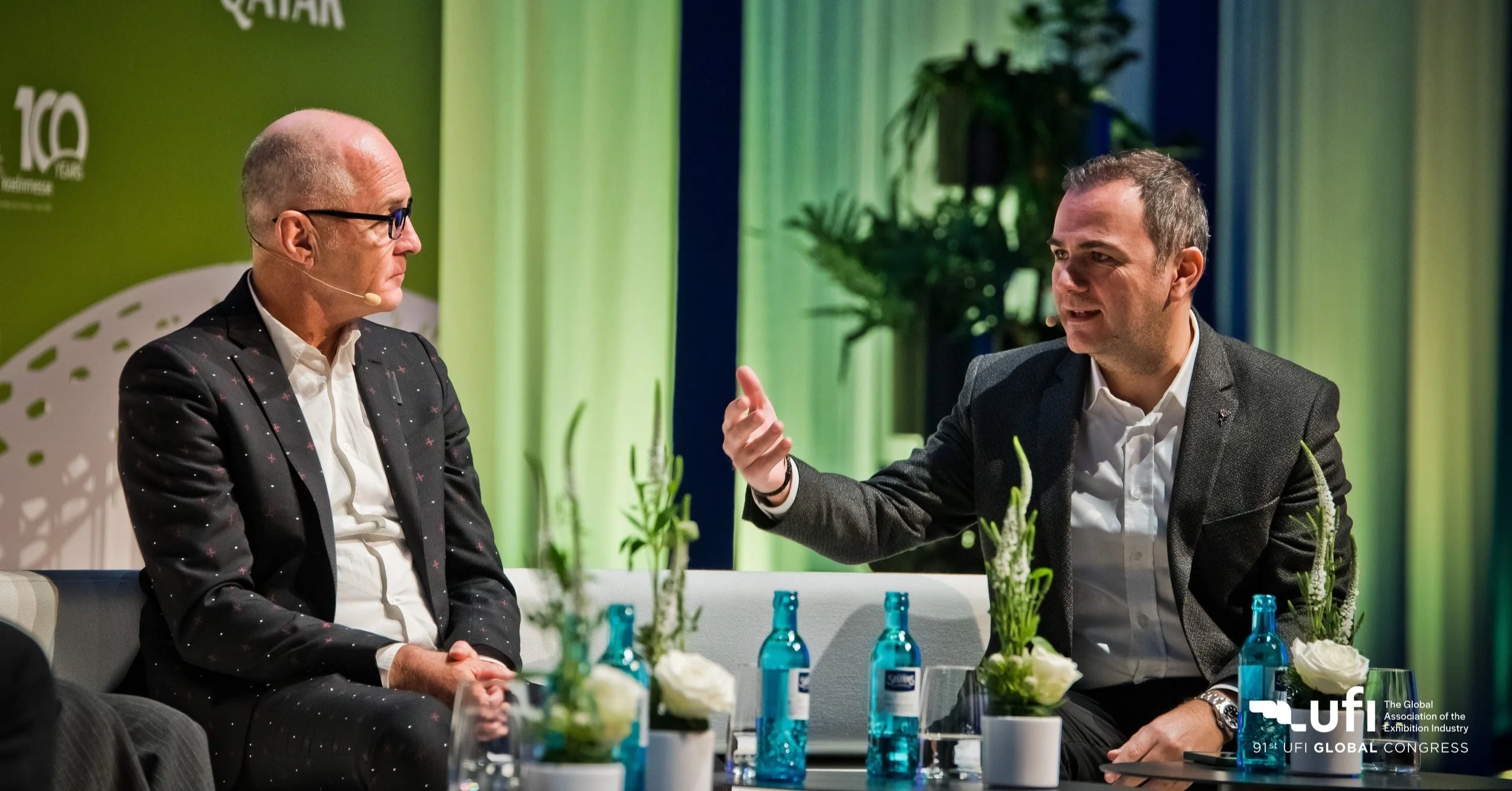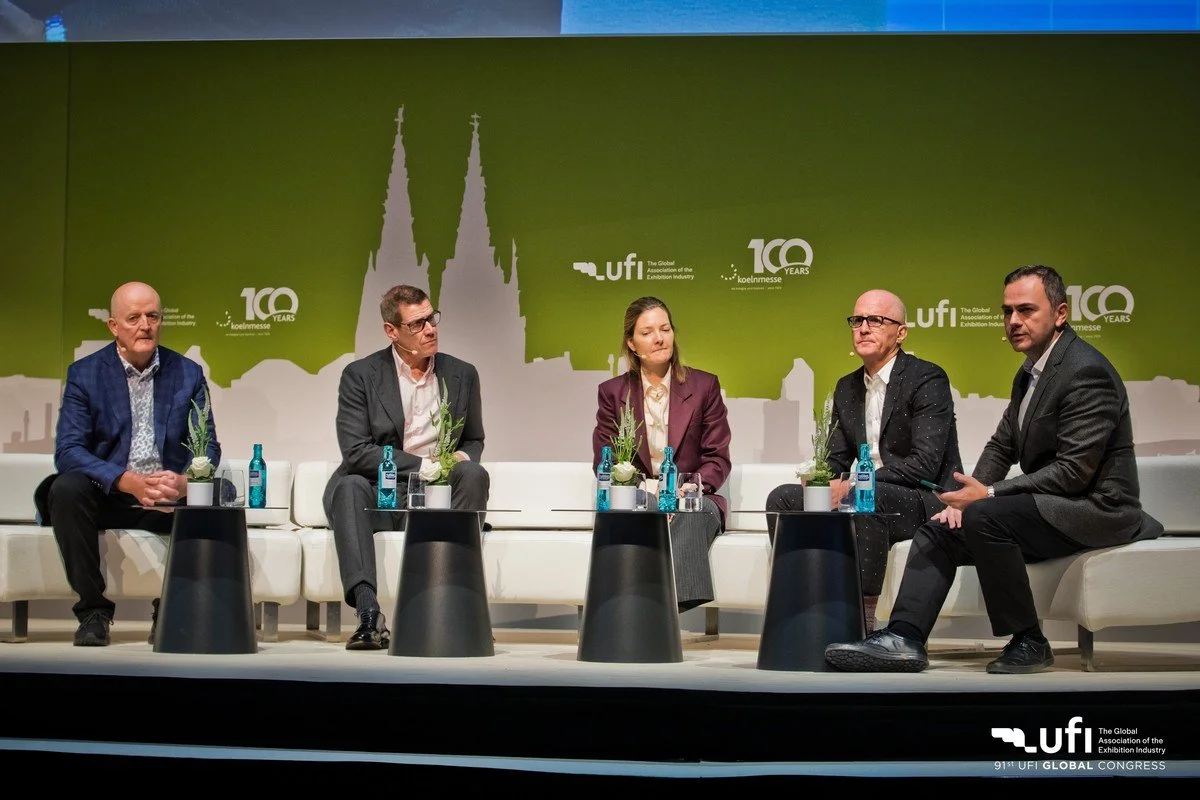Are we in a seller's market? And is Private Equity to blame?
Speaking at The 91st UFI Global Congress in Köln
Last month, I had the privilege of sharing the UFI stage for the second time this year, moderating the panel "Growth and Opportunity in the Global Exhibitions Industry" at the 91st UFI Global Congress in Köln. Even before the actual panel itself, I overheard it being referred to as "the M&A panel" more than once, and to be honest, with good reason.
In my brief opening remarks, informed by our pre-congress coordination call, I emphasised a key consensus from our panellists: the post-COVID revenue rebound is largely done (net sqm could tell another story, though). As a result, we anticipate a return to GDP growth plus a few percentage points as the baseline trajectory for the foreseeable future. That naturally means almost everyone will be looking to top that with inorganic growth, AKA acquisitions.
This is further reinforced by the growing private equity interest in our industry, which appears to be boiling to an all-time high. Combined with the potential decline in the cost of capital in the coming years, we might witness a continuing surge of investment flowing into the market. In this scenario, M&A is set to accelerate, likely driving an increase in market consolidation. More on this here: is the events industry (really) consolidating?
This, in turn, could lead to two distinct outcomes: larger, well-funded corporate organisers may see their market share expand faster, while independent and private organisers could face new challenges in navigating this shifting landscape. Greg Hitchen, Group CEO of Terrapinn, one of the largest private organisers outside PE ownership, shared a good example of this. In his exact words below:
"...we're looking to buy trade shows at the moment, and we can't find enough of what we want to buy..." - Greg Hitchen
Which led me to ask John McGovern, CEO and Owner of Grimes, McGovern and Associates, a well-known lower mid-market M&A Advisory, the following question: Are we in a seller's market?
His take is that the market feels like a seller's market due to higher buyer interest, but transaction multiples haven't shown significant impact. There's increased activity with more NDAs being signed, though not consistently higher offers. A study he cited found 40 private equity firms investing in the sector, especially post-COVID, with much focus on the U.S. market. However, inventory remains a challenge. The UK and Europe have a mature events market with multiple strong players, but in the U.S., despite its larger population, the number of successful players may not be proportionally higher, and many may already be acquired.
So, both Greg and John highlight seller’s market dynamics in the lower mid-cap range of the market. Contrarily, but consistent with the first point above, Russell Wilcox, Executive Chairman, Clarion doesn't feel that way.
Russell noted that the quality of assets coming to market post-COVID, particularly in the U.S., has been pleasantly surprising. Many of these are founder-owned businesses with strong performance and niche positions in large end markets. While not all assets are relevant due to differences in size, sector, or focus, the overall quality has exceeded expectations. He also observed that the buyer landscape has diversified, with more players consolidating assets, though this hasn’t disrupted their approach or felt unmanageable.
So, a polar opposite dynamic at the higher end of the market, evidenced by a few big moves this year, notably EasyFairs, HLTH, Ascential, etc., with a combined (estimated) value well north of £2bn. So, why? And who's to blame?
One usual suspect is PE. I asked Franziska Kayser, Partner TMT, KKR, the world's second-largest PE Investor (according to Private Equity International's PEI300 list), who just invested £1,1Bn into events, albeit in B2C Festivals: Why did you invest in in-person experiences?
I share her reply in her own words:
"We do think it's a very interesting industry. I think it's very interesting because with COVID and everything shutting down, we have seen that the trend of life experiences over things is something that could not be broken. I think there is going to be continued growth, both in a consumer context and also in a in a more sort of business context as well." - Franziska Kayser
Franziska also noted that groups with strong niche brands will likely continue attracting top brands, creating a self-sustaining growth flywheel. The industry remains highly fragmented, and creating a space for like-minded entrepreneurs to join larger groups allowed for greater investment opportunities, whether it's ticketing, data or marketing. Lastly, she added that the asset-light nature of the business model has appealing financial characteristics.
It's encouraging to see the confidence Private Equity has in our industry and the acknowledgement of the positive cycle ongoing investment can create for B2B event businesses. With that in mind, I asked Russell about the growth opportunities made possible through their private equity support.
He stated that Clarion has been PE-owned for nearly 25 years and is gaining much more than just funding from the partnerships. While the PE-enabled resources are valuable, the true benefit lies in aligned, transparent relationships that enable dynamic decision-making and long-term strategic planning without the pressure of quarterly earnings. According to Russell, PE ownership ensures Clarion remains accountable, honest, and focused on delivering exceptional customer experiences, always prepared for market scrutiny. It’s about pace, alignment, and a shared vision—not just financial backing.
From left to right: Greg Hitchen, Russell Wilcox, Franziska Kayser, John McGovern, Dr. Barış Onay
So far, we established the availability and eagerness of capital deployment in the industry, but there's another side to this story—the one of the entrepreneur.
The panel agreed that one of the best things about our industry is its accessibility. With low barriers to entry, many entrepreneurs get their start by attending a conference, studying the market, and identifying untapped opportunities with strong potential. Greg added this is precisely how businesses like Terrapin have launched their journey. The business models in our space are refreshingly straightforward—there’s no need for complex software development or large-scale manufacturing facilities. It’s an industry where aspiring entrepreneurs can truly thrive. Success here revolves around people, content, community, and the values we deeply understand and share.
One often overlooked factor that could drive meaningful change in this space is early-stage capital. According to John, this type of funding is especially valuable for businesses around the $2 million revenue mark, where many face a classic chicken-and-egg dilemma: they need resources to grow but require growth to secure resources. Historically, access to this kind of funding has been limited, leaving a critical gap in the support ecosystem.
Russell added that larger companies have the ability to take action—and they've successfully incubated businesses from the ground up. Some entrepreneurs seek that kind of support, and that has led to many highly successful ventures.
Lastly, I asked Franziska, adding its seemingly unending entrepreneurship potential to many other positive dynamics of the industry, how she felt about the future of the events industry.
She highlighted the enduring human need for real-life connection, emphasising that while screens can support some business interactions, they fall short of fostering meaningful relationships. According to her, the fundamental trend—the desire for in-person connection—remains strong and unchanged.
Great to hear from the world's 2nd biggest investment firm!
She also pointed out the importance of the brands and the people behind them, noting the presence of incredible entrepreneurial teams and strong brands capable of bringing like-minded individuals together. Franziska believes meaningful early investments in brand development, technology, international expansion, and M&A enable entrepreneurs to elevate their businesses, and she sees significant potential for similar growth and innovation in this industry.
In conclusion, the events industry remains strong, driven by the timeless human need for genuine connections and in-person experiences (more science on that here). At the dawn of the age of AI, these dynamics attract interest from institutional investors, with a strong feeling that "there is more to come".
If you’d like to have a chat about what I think is next to come, drop me a line here.
Dr. Barış Onay
The recording of this session is available in your UFI member zone. If you’re not a member, you know what to do.

